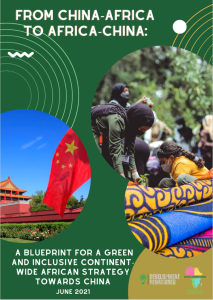It’s time to ask and it’s time to get – is the key message of a new Development Reimagined report, written with African leaders and policy makers in mind and also of huge interest to African NGOs and governments worldwide. The report – boldly entitled “From China-Africa to Africa-China: A Blueprint for a Green and Inclusive Continent-Wide African Strategy towards China” – for the first time attempts to craft a comprehensive strategy for what African countries should – or at least could – be trying to get out of the China relationship.
“Too often we think of African countries as passive recipients” says the report’s lead author, trade lawyer, Patrick Anam. “It’s time to change that, starting with China”. Mr Anam is keen to stress the report is not aimed at singling out China, or even implying by its existence that China is a worse development partner than any others. In some ways, he notes, it’s to the contrary. Africa’s plans to become a global manufacturing hub necessitate early, strong engagement with the world’s current manufacturing hub. He believes this plan could even provide a template for African engagement with other global powers including the G7.

The report sets out how responsive China has been to African demands in the past. Furthermore, Africa’s plans to become a global manufacturing hub necessitate early, strong engagement with the world’s current manufacturing hub, while the economic effects of COVID-19 have exposed both vulnerabilities and opportunities that African countries have in their relationships with China. Describing it as an important “public good”, Development Reimagined has published the report in anticipation of the next Forum on China Africa Cooperation (FOCAC) meeting, expected to be held in Dakar in late 2021.
Through fascinating, unique analyses – a survey of African Ambassadors in China, trade modelling, and “benchmarking” – “From China-Africa to Africa-China” impartially assesses the Africa-China relationship to date and its potential future. With proposals for African “asks” on trade to tourism to new loans from China, the report’s recommendations hope to form part of the negotiations by African leaders in the run up to FOCAC. If they do, this will support increasing African agency in development work and foreign policy more broadly.
The report is available in English here.
The report is part of Development Reimagined’s ongoing Africa Unconstrained discussion. So far the project has featured a debt guide, webinar series, a working paper and podcast/video series of interviews with African thought leaders, all of which are featured on the Africa Unconstrained website: www.africaunconstrained.com
For more information email: clients@developmentreimagined.com
June 2021


